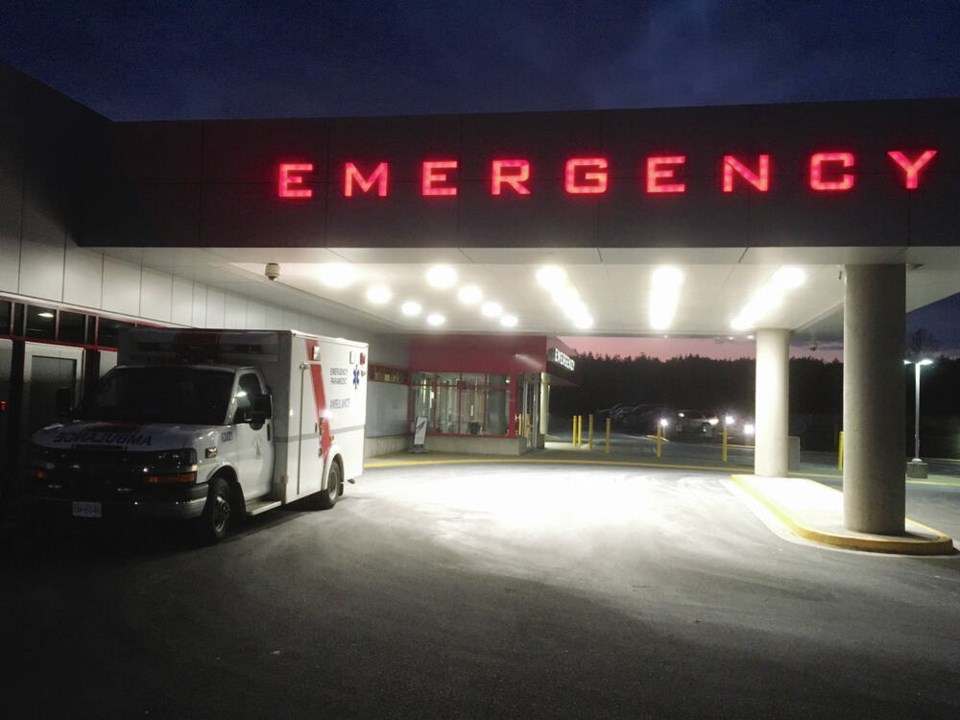B.C. could soon see physician assistants hired to help doctors in emergency departments such as the one at Saanich Peninsula Hospital, where staffing shortages have led to closings.
The Health Ministry announced Wednesday that it’s for the next seven days on proposed bylaw changes to enable physician assistants to work in emergency departments throughout the province.
The consultation is a joint initiative of the ministry and the College of Physicians and Surgeons of B.C.
If approved, the amended bylaw will allow physician assistants, who will have to register with the college, to practise in emergency departments under the supervision of physicians.
Over the past year, physician assistants have ramped up their fight to be licensed in B.C., as they are in other provinces.
Lisa Stewart, director of the B.C. division of the Canadian Association of Physician Assistants, said in an interview that Canadian physician assistants are ecstatic over the news.
“We are now about to have physician assistants working in all provinces across Canada,” said Stewart, who is trained as a physician assistant and lives in Comox.
Physician assistants are already licensed to practise in New Brunswick, Nova Scotia, Ontario, Manitoba and Alberta. Saskatchewan, Quebec, Prince Edward Island, and Newfoundland and Labrador have made legislative changes toward licensing them, said Stewart.
She said the B.C. Health Ministry is being strategic in first opening the door in emergency departments to “try and carve out a niche for physician assistants.”
Doctors of B.C. president Dr. Joshua Greggain said the association has been pushing for physician assistants since 2013. “We’re very thankful that’s being done now — the sooner the better,” said Greggain.
He added that while the assistants will start in the emergency room, it’s likely they will later expand to other areas of the health-care system.
Given that physician assistants already have a national college and are licensed in other jurisdictions, the change should come into effect quickly, he said. “I never want to predict the timeline for bureaucracy, but I would sure hope that we could get this going by the end of the year.”
Dr. Charles Sun, a staff physician at Westshore Urgent and Primary Care Centre who has worked with and helped train physician assistants, said he “literally shouted with joy” when he heard the news. “The last time I shouted was in 1967 when I got into medical school.”
Working under the supervision of physicians, physician assistants can perform patient exams, order laboratory and diagnostic tests, prescribe medications, manage treatment plans, and advise patients on preventative health care.
Dr. Jeff Unger, who works in the Saanich Peninsula Hospital emergency department, now closed overnight due to a staffing shortage, called the news a “potentially incredibly positive change” for emergency departments across the province.
Unger said Island Health has been working with Saanich Peninsula Hospital on a proposal for a trial of physician assistants at the hospital. “This is a practical, relatively easily deployable and evidence-based medium-to-long term solution that has been shown to be more cost effective than other staffing alternatives, such as nurse practitioners.”
Unger said the rapid timeline for consultation on proposed bylaw changes is also encouraging. And while it’s not a “panacea for the multitude of crises” in the health-care system, it will certainly help, he said.
B.C. United health critic Shirley Bond and B.C. Green leader Sonia Furstenau and deputy leader Dr. Sanjiv Gandhi have all advocated for physician assistants.
There are three physician-assistant training programs in Canada — at the University of Manitoba, University of Toronto and a satellite site at McMaster University in Hamilton, Ont. Training generally takes 24 months, with more than 2,000 clinical training hours.
Two new physician assistant schools are in development at Dalhousie University in Nova Scotia, with plans to open 24 seats next year, and the University of Calgary in Alberta, with plans to offer 40 seats, although no date has been announced, said Stewart.
Graduates can then write the certification exam from the Physician Assistant Certification Council of Canada to practise in the country, according to the Health Ministry.
There are approximately 30 to 50 physician assistants living in B.C. and more than 1,000 across Canada, said Stewart. Many in B.C. were trained through the military.
Stewart says it’s unknown how many will or can quit their current employment to work as physician assistants, how many working outside B.C. will return home, or how many will come out of retirement.
Most physician assistants in B.C. have kept up their certification, though some who have worked in family practice may have to upgrade some skills to work in emergency departments, she said.
“There absolutely will be a process of a few months to gear up,” said Stewart. “It will be interesting to see where we’re at in six months, but I think PAs can absolutely be making a contribution by then.”
There are about 200,000 physician assistants working in the U.S., said Stewart, with four physician assistant schools in Washington state alone. Sorting out the different certifications and requirements in Canada and the United States will be something to explore later on, she said.
Alberta requires American physician assistants to be certified under the Canadian system, while Ontario and Manitoba do not, she said.
“It will be interesting to see the avenue that B.C. takes in trying to recruit physician assistants as well.”
You can view the proposed amended bylaw and provide feedback through the .
>>> To comment on this article, write a letter to the editor: [email protected]



